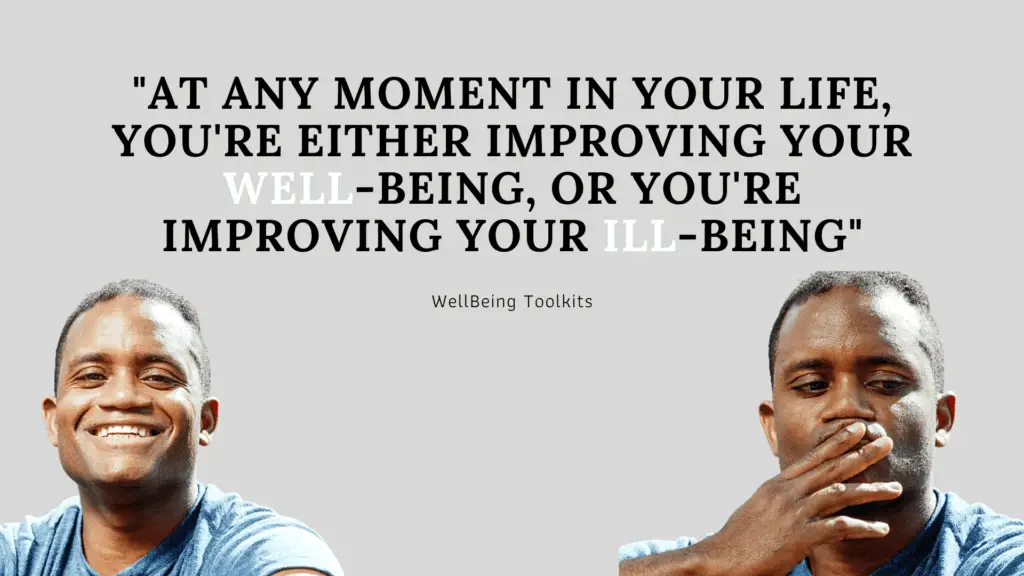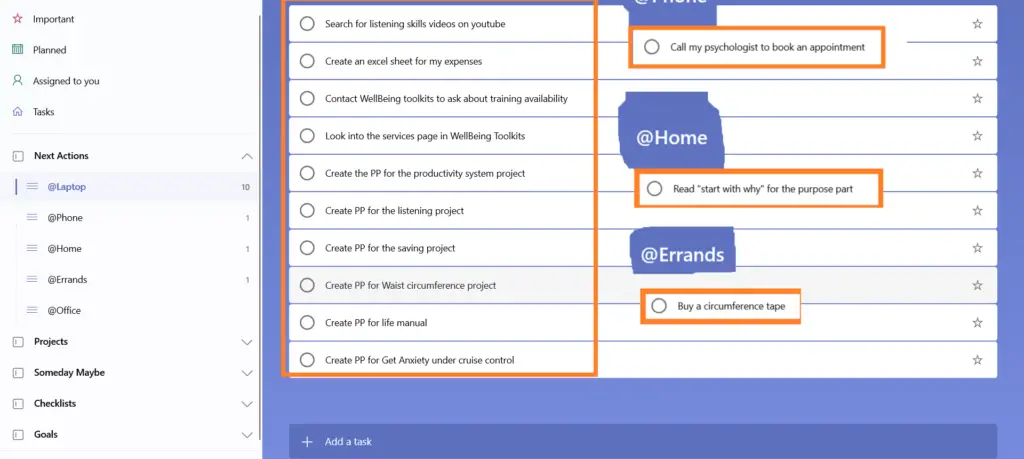
Content Covered Today:
What is Wellbeing definition?
Wellbeing goes by many definitions:
CDC defines it as:
There is no consensus around a single definition of well-being, but there is general agreement that at minimum, well-being includes the presence of positive emotions and moods (e.g., contentment, happiness), the absence of negative emotions (e.g., depression, anxiety), satisfaction with life, fulfillment and positive functioning.4, 33-35 In simple terms, well-being can be described as judging life positively and feeling good
Cambridge defines it as:
The state of feeling healthy and happy. (1)
Merriam Webster defines it as:
The state of being happy, healthy, or prosperous. (2)
My definition to wellbeing is:
It’s the state of being well in every dimension of your life, and treating it as a whole, mentally, physically, socially, emotionally, financially, and spiritually.
AS you can see, there’s really no consensus on the definition of well being, but I bet you can see common factors:
A- It’s a state:
So it’s not tangible. You can’t really hold it in your hands, so identifying this will make you aware that for the most part, it’ll be measured subjectively, more than objectively.
The good news is, the only judge there is YOU
B- It’s multidimensional:
It has more than one toolkit, or aspect, or dimension, or part of your life, so health, wealth, happiness, and others.
This means that when you want to improve your wellbeing, and therefor your life, you have to care about the big picture, not just pieces of it
Personally I love and work with the definition I have, since it incorporates the act of being, which translates to DOING, and it has all the dimensions you need to care about for your wellbeing to be whole.
So, Wellbeing is the state of being well in every dimension of your life, and treating it as a whole, mentally, physically, socially, emotionally, financially, and spiritually
WellBeing toolkits
What are the dimensions of WellBeing? (The WellBeing Toolkits)
From the definition above, you’ll find that wellbeing is composed of 6 areas; mental, physical, financial, social, emotional, and spiritual.
That’s why we’ll cover the 6 WellBeing Toolkits for these 6 different areas
Mental WellBeing:
This toolkit is about improving you mentally to be capable of overcoming relevant challenges like depression, anxiety, failure, etc
In the mental wellbeing toolkit, we cover important tools you can use like:
Productivity: learning it and having a working system to serve your whole life, not just your work life
Mindset: Learning, understanding, and choosing the right mindset to improve your whole wellbeing and life
Learning: How to always improve yourself by learning new and relevant things
Physical WellBeing:
This toolkit is about improving you physically to be capable of overcoming health related challenges, like sickness, pain, and weakness
In the physical wellbeing toolkit, we take care of one of your important assets, your body, so we cover important tools you can use like:
Exercise: Why, How long, when, what type
Nutrition: Why, How long, what to eat/drink more of, what to eat/drink less of, etc
Ergonomics: We teach you how to maintain your musculoskeletal structure when sitting, standing, sleeping, and driving
Sleep: Why, How much, When, etc
Financial WellBeing:
This toolkit is about improving your financially to overcome money related challenges and have the financial freedom to do anything you want
In the financial wellbeing toolkit we cover important tools like:
How to deal with money, Saving tips, Investing tips, Making money tips
Social WellBeing:
This toolkit is about improving your social skills to deal with everyone around you. After all, we’re social wellbeings
In the social wellbeing toolkit, we cover tools like:
Communication skills, Parenting, Negotiation/persuasion
Emotional WellBeing:
This toolkit is about improving your emotional intelligence (EQ), to be able to deal with feelings better.
This involves your feelings and others feelings as well
In the emotional wellbeing toolkit, we have tools like:
Emotional intelligence (EQ), How to perceive emotions right, How to understand emotions, How to deal with emotions
Spiritual WellBeing:
This toolkit is about improving your life’s manual or script.
This is where we cover your relationship with your life, yourself, others but in a higher level. This is where you understand your purpose in life, and your relationship with your community and society in the rest of the world (Yes believe it. You really have something to offer to the rest of the world)
In the spiritual wellbeing toolkit we cover very important tools like:
Life’s purpose: why you’re here ? What is the purpose of your life?
Life’s goals: What are you trying to achieve
Life’s Principles and values
As you can see, in WellBeing Toolkits, we aim at improving your life as a whole and we’ll do whatever we can, and beyond, to empower you with the needed tools to upgrade those dimensions
Sometimes I call those 6 areas, the WellBeing Body, because any impact on one or more of these areas, it will have an impact on the wellbeing as a whole.
They go like this:
Mental wellbeing: the head, as it represents the thinking, learning and all brain and mind actions
Physical wellbeing: the right leg, as it represents one of the basic limbs used in movement
Financial wellbeing: the left leg, as it represent another basic need of movement. If you’re moving then for the most part you’ll be spending (gasoline, bus tickets, etc)
Social wellbeing: the right hand, as it represents the limb we use in shaking hands when meeting people
Emotional wellbeing: the heart, I think it’s obvious 😀
Spiritual wellbeing: the left arm. To be honest, I couldn’t find true representation here nor I couldn’t find another area in the body for this dimension. IF you have any thoughts let me know in the comments below. I can use a hand
Anyway, this is the other name I have for them, again to represent how crucial it is for you to treat your wellbeing as a one body.
Why WellBeing is important?
This is an interesting question indeed. Why should you care about your wellbeing and improve it?
I can go on and on here and list you many benefits of improving your wellbeing, but I won’t
Instead I’ll let you scroll up a little bit to the part that has the 6 areas mentioned with the relevant tools and I’ll let you ponder there for a moment and come up with benefits yourself.
If I’m coaching you on this part, I wouldn’t be listing you the benefits, instead I’ll be asking you this:
What do you think you’ll gain if you improved your (dimension) wellbeing?
Replace (dimension) with mental then answer then do the same with the rest of the wellbeing dimensions.
Have fun exploring!! 😀
Who should care about WellBeing?
Personally speaking, I would say EVERYONE.
Individuals, communities, governments, parents for their children, schools for their teachers and students, employers for their employees, men, women, young, adults, old, east, west….
I think you got it
Yes everyone should start working on improving their wellbeing. It’s gonna be different for everyone and that’s okay.
Individuals will have different goals to work on than governments. Men will focus on different things than women. Young will need to strengthen certain areas that an old person wouldn’t find needed, etc
How long should I care or maintain my WellBeing?
As long as you’re living. This is a lifelong game or an Infinite Game as Simon Sinek calls it.
It goes without saying that you will want to be happy for as long as you can, so you’ll keep working on maintaining your “happiness” tools for as long as you can to fulfill that goal.
I have never met a person who’s planning to have a disease for the pleasure of it, so I am sure you want to be healthy for as long as you can be. Then for that to happen, you’ll need to keep your physical tools working
Bottom line is, Maintaining your wellbeing is a lifelong journey which means two things to consider:
1- You don’t beat yourself up if you fell down:
Don’t get hard on yourself every time you missed exercising or deviated from your healthy meal or spent your saving on a “silly” thing, or snapped at your kids for a moment.
If it’s a lifelong journey, and that’s a long journey relatively speaking, then you have to be sure you’ll slip off and THAT’S OKAYYYY
2- You’ll have to update yourself every once in a while:
It’s a long journey so practically speaking what works now may not be working as efficient or at all 5 or 10 years from now.
That’s why you’ll have to embrace the fact that being updated is part of the process
How long does it take to see results for my WellBeing?
It varies from instant to later depending on your goal
For the physical wellbeing for example, it takes relatively long time to see results if the goal is losing or gaining weight, and the results could be instant if the goal is about feeling good which happens right after the exercise or eating a healthy meal (except if you’re eating broccoli :D).
For the financial wellbeing, results could be instant each time you “save X dollars” or each time you “gain X dollars”, or it can be few months later saving or making money to buy certain product, and it can be years later to fund for your business or college tuition.
I think it’s safe to say that one key instant result would be the “good feeling” when doing the action(s). This is a key thing to hold on to, and to think about deeply as it has more impact than meets the eye.
My rationale with embracing the momentary good feeling is that it could be our motive or reason to keep going.
If we got addicted to the momentary pleasure of exercising or eating or saving, the same way we are addicted to the pleasure of spending time on social media, or smoking, or drinking, then we’ll be a lot better to have this “good addiction” as a tool, don’t you think?!
Yes you should be practicing around 3-5 times a week to be healthy and attend your grandchild’s wedding, but if you can’t do it, you’ll be a lot better doing it once or twice a week just for the sake of that momentary good feeling that follows compared to not doing it at all
How wellbeing is measured?
As agreed above, wellbeing as a whole, is a state of being or feeling so it’s not a tangible thing to measure literally. Rather it can be measured using self assessments tools that track your state of being or feeling over time.
For the wellbeing toolkits themselves, some of them are tangible and can be measured easily, like money saved or money gained, or blood pressure and Body Mass Index (BMI) readings, persons you have helped, goals achieved, etc.
That’s why when it comes to wellbeing assessment you’ll have to look at both assessments, the toolkit itself and the wellbeing overall cause your feeling about it still matter.
You can be earning money as planned, but if you’re not feeling good about it, then something is off and you need to park the car and check it before going any further.
Over the years, for public health surveillance purposes, CDC has measured well-being with different instruments including some that are psychometrically-based, utility-based, or with single items. (3)
What are the WellBeing Factors and Challenges?
1- Not making it a priority
This is one big factor that have a negative impact on your wellbeing. Making everything else a priority on the expense of your wellbeing will only aid you in improving your ill-being instead.
2- Genes
Genes play a role in determining your wellbeing. Studies have found that positive emotions for example are heritable to some degree. That emotions such as happiness and sadness can be transferred to you genetically
3- Personality
Personality plays a role in wellbeing too, since optimistic persons are more liable to happiness than do pessimistic persons. Extroverts are better with social skills than introverts.
4- Age
According to studies, younger and older adults tend to have better wellbeing than middle-aged adults
What are recommended books about Wellbeing?
You may be thinking, “great, I’m invested and want to read a book or two about this, what do I read?”
I would say that personally speaking, I didn’t come across one book that talks about the whole idea of wellbeing, with all it’s components, and what you need to do, in a way that I’d recommend
I have a goal of writing a book that provides you with a manual for how to handle your wellbeing in a systematic way. Kinda like what I’m doing here, and still it wouldn’t be as detailed as should be unless I write a series.
For the time being, I have a list of highly+++ required and recommended books for each dimension that you can start reading and applying today here
What should I do Next?
In your own system that you’re using to be productive and get things done, add the following:
1- Create a Goal for Wellbeing in your goals folder:
Add “Improve my wellbeing by 1% in (put year)


2- Create a project in your projects folder:
Add 1 project you can accomplish this year for each of the wellbeing dimension we covered above.


3- In your next actions folder:
1- add “create a project plan for (name of the project) with total of 6 next actions of those, 1 for each project.
2- Add all the actions that you can do too immediately for each project


What is Your Conclusion?
- Wellbeing is an important goal that you should be working on today. You’re either improving it or improving your ill-being. Your choice
- There are 6 WellBeing toolkits you should have for a better wellbeing. Mentally, Physically, Financially, Socially, Emotionally, and Spiritually
- The benefits of WellBeing are the sum of the benefits of each dimension, and they are very individualized to a major extent
- WellBeing is for everybody to care about and look for with results felt and seen both instantly and later on
- Some areas of wellbeing are measured subjectively (like happiness) and some are measured objectively (Money saved) and you need to use both assessments when tracking your progress
- There are some factors that could have an impact, positively or negatively, on your wellbeing, and with that being said, the larger portion is on your decision to prioritize it and really work on improving it
- There is number of books you can read that cover a wide range of dimensions and you can find them here.
References
1- https://dictionary.cambridge.org/dictionary/english/well-being


